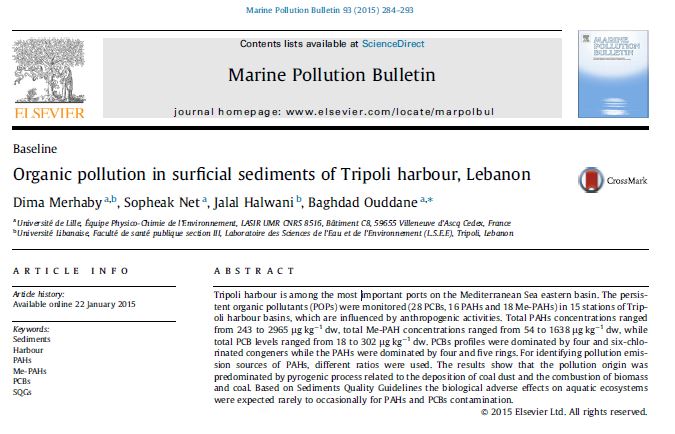Organic pollution in surficial sediments of Tripoli harbour, Lebanon
 |
thesis Jan 2015
Ed. LU - Beirut
Downloadable format: PdF
Abstract:
Tripoli harbour is among the most important ports on the Mediterranean Sea eastern basin. The persistent organic pollutants (POPs) were monitored (28 PCBs, 16 PAHs and 18 Me-PAHs) in 15 stations of Tripoli harbour basins, which are influenced by anthropogenic activities. Total PAHs concentrations ranged from 243 to 2965 μg kg(-1)dw, total Me-PAH concentrations ranged from 54 to 1638 μg kg(-1)dw, while total PCB levels ranged from 18 to 302 μg kg(-1)dw. PCBs profiles were dominated by four and six-chlorinated congeners while the PAHs were dominated by four and five rings. For identifying pollution emission sources of PAHs, different ratios were used. The results show that the pollution origin was predominated by pyrogenic process related to the deposition of coal dust and the combustion of biomass and coal. Based on Sediments Quality Guidelines the biological adverse effects on aquatic ecosystems were expected rarely to occasionally for PAHs and PCBs contamination.
Target Audience:
Keywords: |
access to sanitation (CI) (DT) (ET) (ope) , access to water (CI) (DT) (ET) (ope) , urban (CI) (DT) (ET) (ope) , waste control (CI) (DT) (ET) (ope) , water quality (CI) (DT) (ET) (ope) |
Country: |
Publisher/Broadcaster: |
|
LU
-
Université Libanaise - Beirut - Lebanon |
If there is a broken link, we will be pleased to receive a message: communication@pseau.org